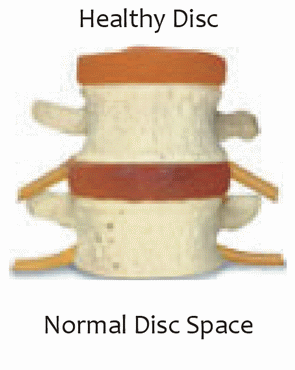
With increased age, trauma, repetitive stress and poor posture, our discs lose elasticity, flexibility and shock absorbing ability due to the fact that collagen molecules weaken and proteoglycan content (which attracts water) decreases. As a result, the discs become brittle and lose water (they become dehydrated). This seriously affects the shock absorbing properties of the discs and they compress under normal pressure.
Although the discs do not have a blood supply, they do have a nerve supply. This nerve supply is often responsible for the back pain patients complain about. The most common symptoms are neck or low back pain; these can be associated with arm or leg pain and/or numbness in more severe cases.
Typically, x-rays show decreased disc height and bone spurs as the body responds to this instability by laying down new bone to stabilize the spinal column.
